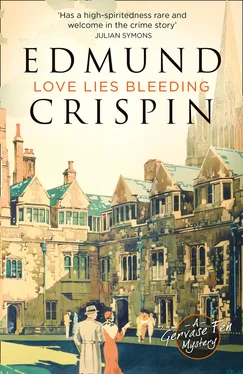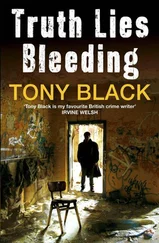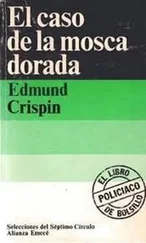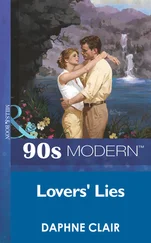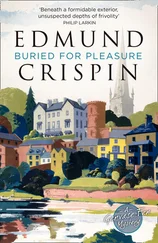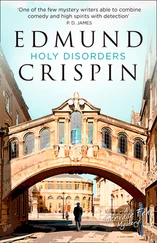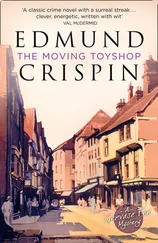‘And you’re prepared to swear,’ he said, ‘that after the rehearsal you never set eyes on the girl?’
‘Yes, sir. That’s the truth.’
The headmaster sat down abruptly in the swivel chair behind his desk. ‘As I said before, you must not make assignations with young women.’
‘No, sir.’
‘Nor must you, on leaving this room, go round complaining about obscurantist repression of wholesome desires.’
‘No, sir, I shouldn’t dream—’
‘Your mind, Williams, is probably full of half-baked Freudian dogma.’
‘Well, actually, sir—’
‘Forget it. God forbid that you should be permanently celibate. But the term lasts only twelve weeks, and if you can’t abstain from the opposite sex for that length of time without suffering psychological damage, then your brain is an altogether feebler instrument than I’ve hitherto believed.’
Williams said nothing; his logic was incapable for the moment of contending with all this.
‘And in conclusion,’ the headmaster remarked, ‘kindly remember that there will be hell to pay if you attempt to meet this girl again…Now go away.’
And Williams took himself off, mightily pleased both at the efficacy of Mr Etherege’s spell and at the headmaster’s directness and good sense. He did not suspect that the headmaster’s directness and good sense had been carefully calculated so as to appeal to his own youthful mixture of idealism and cynicism. The headmaster had had considerable practice in getting the results he wanted.
Perceiving that Pargiton lingered in front of the teaching block, the headmaster sought, and found, confirmation of Williams’ narrative. He then telephoned to the High School and gave Miss Parry a concise summary of what he had learned.
‘I see,’ she said. ‘In that case, I’ll return to the attack. How long could Brenda have waited in the science building?’
‘Until about half past ten, I suppose, when Wells locks it up for the night.’
‘Good. Thank you very much.’
‘By the way,’ the headmaster added, ‘you might let me know what results you get.’
‘Of course,’ said Miss Parry. ‘I’ll telephone you later on.’
‘Later on’ proved to be about ten minutes before the beginning of afternoon school.
‘Look here,’ said Miss Parry, ‘are you quite certain that boy is telling the truth?’
‘I’m positive,’ the headmaster replied. ‘Why?’
‘Brenda denies that she ever went anywhere near the science building.’
‘Oh, Lord…Well, mightn’t that simply mean she was leading Williams up the garden path?’
‘It may. I don’t know.’
‘Does she deny having arranged to meet Williams?’
‘No. She wanted to at first, but I think that was only to protect the boy. She maintains that she thought better of it, and went home instead.’
‘I see…No other information?’
‘Nothing. The girl’s as obstinate as a donkey…There’s only one thing I’m sure of.’
‘What’s that?’
‘Something,’ said Miss Parry, ‘has nearly frightened her out of her mind.’
3
Thieves Break in and Steal
The site of Castrevenford School is a substantial rectangle, bounded on the west by the river Castreven and on the east by a main road. Elsewhere the line of demarcation is vaguer: northwards the playing fields peter out indeterminately into farming land, while to the south there is a confusing huddle of school buildings adjacent to a disorganized cluster of houses named Snagshill, which is a suburb both of Castrevenford and – more definitely – of the school itself. The main teaching block – a large but comfortless eighteenth-century erection of red brick, ivy-covered and a kind of game reservation for mice – stands isolated on the western boundary, with a clock tower, roofed by well-oxidized copper, surmounting it. From it, a gentle slope, planted with elms and beeches and riddled with rabbit warrens, runs down to the river bank. Here the school boathouse is situated, and a substantial landing stage. Across the river there are fields, woods, a distant grange; and beyond them can be seen the towers and spires of Castrevenford town, three miles upstream.
The boarding houses are seven in number, scattered irregularly about the circumference of the site. At the north-eastern angle is the chapel, an uncommonly hideous relic of late Victorian times, put up with such parsimony and haste that the authorities go in hourly fear of its subsidence or total collapse. The school gates open on the main road. A long drive runs from them, through an avenue of oaks, to the teaching block – which may be most conveniently referred to by its tide of Hubbard’s Building. Near the gates is the hall, severely box-like and utilitarian. The science building, the scout hut, the armoury and the library are grouped together on the south side near Davenant’s, which is the largest of the boarding houses. In it the headmaster’s study is situated, since his private house is half a mile away from the site.
The rest of the area is occupied by playing fields, squash and fives courts, the gymnasium, the swimming pool, the tuck shop, and the carpenter’s workshop. It is provided with a complex tracery of asphalt paths designed specifically, in the view of the boys, to make them walk the maximum possible distance between their houses and Hubbard’s Building.
It was this scene – or at all events a part of it – that the headmaster contemplated as he stood at his study window, meditating the problem of Brenda Boyce. At five minutes to two the school bell began tolling, and the headmaster, finding his conjectures profitless, fell to considering whether, in spite of the more conservative members of the staff, its wretched clangour should not be permanently silenced. The thing was intended, of course, to encourage punctuality; but it had not been used during the war, and the resumption of its daily tintinnabulation had resulted in no appreciable decrease in the steady minority of latecomers. There were too many bells at Castrevenford altogether. There were the clock chimes, which sounded the hours, halves and quarters with peevish insistence; the bells in the science building; the electric bell which marked the beginning and end of each lesson; the handbells in the houses; the chapel bell, which had obviously suffered some radical mishap during its casting…
By now the site was filled with ambling droves of boys, converging on Hubbard’s Building with books and files under their arms. And among them the headmaster observed Mr Philpotts, running across the dry grass towards Davenant’s.
Mr Philpotts was a chemistry master whose principal characteristic lay in a sort of unfocused vehemence, resulting in all probability from an overplus of natural energy. He was a small, stringy man of about fifty, with immense horn-rimmed spectacles, a long, sharp nose, and an unusual capacity for garrulous incoherence. In his present haste lay no reason for apprehension or surprise; he always ran, in preference, apparently, to walking. But unfortunately he was of a complaining disposition; the smallest upset was liable to bring him scurrying to the headmaster’s study, full of ire and outraged dignity; and the headmaster, watching his approach, had little doubt that in another minute or so Mr Philpotts would be assaulting his ear with some complicated tale of woe.
The prospect did not depress him unduly, since the wrongs and affronts which Mr Philpotts suffered seldom demanded more than a little tact in their settlement. And so, when Mr Philpotts knocked on the study door, it was with a cheerful voice that the headmaster invited him in.
It soon became plain, however, that Mr Philpotts had something of more than ordinary importance to relate.
Читать дальше
